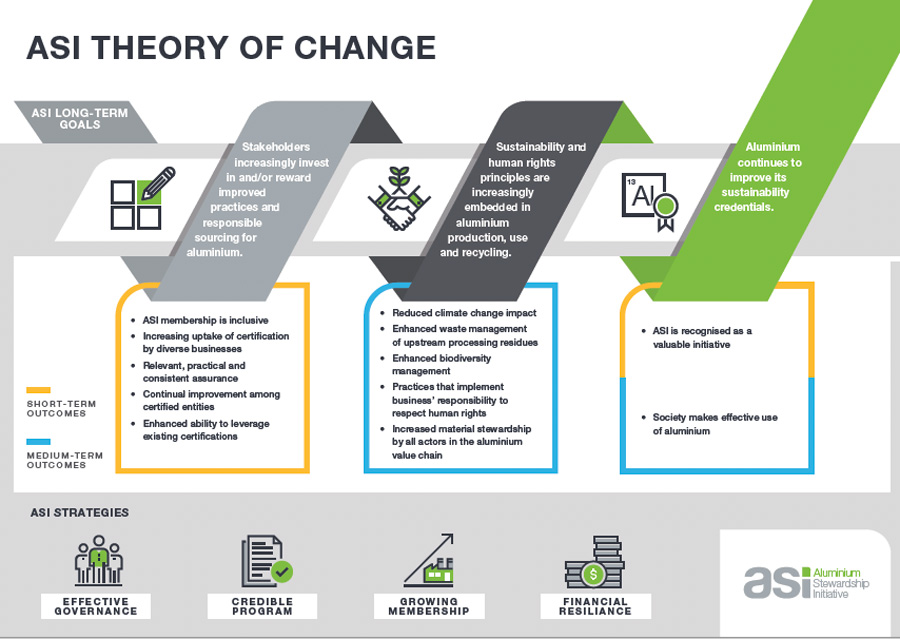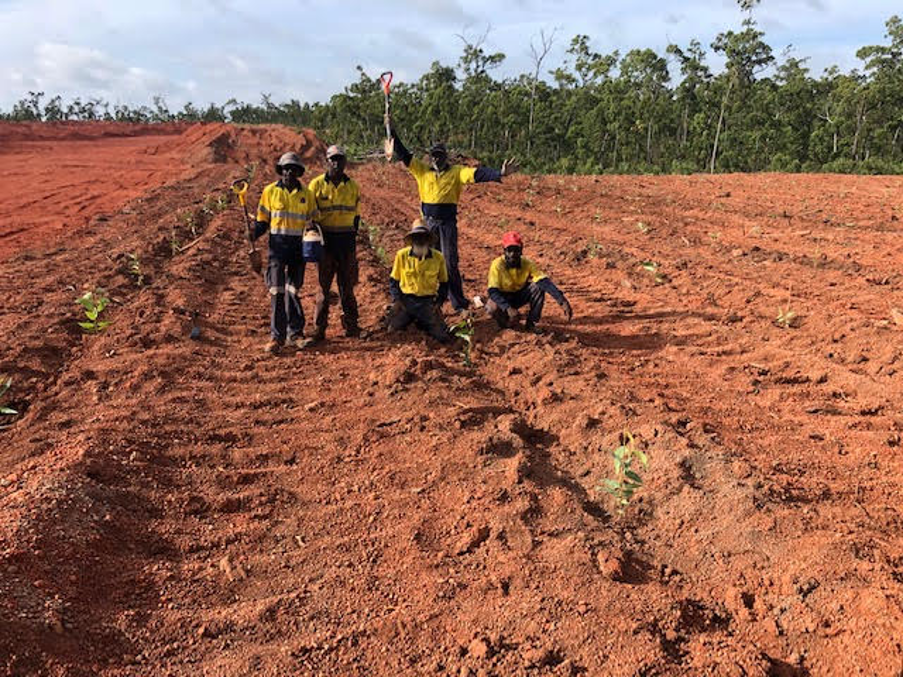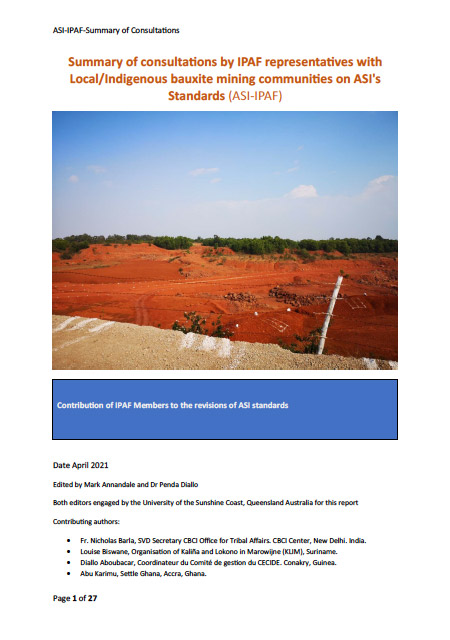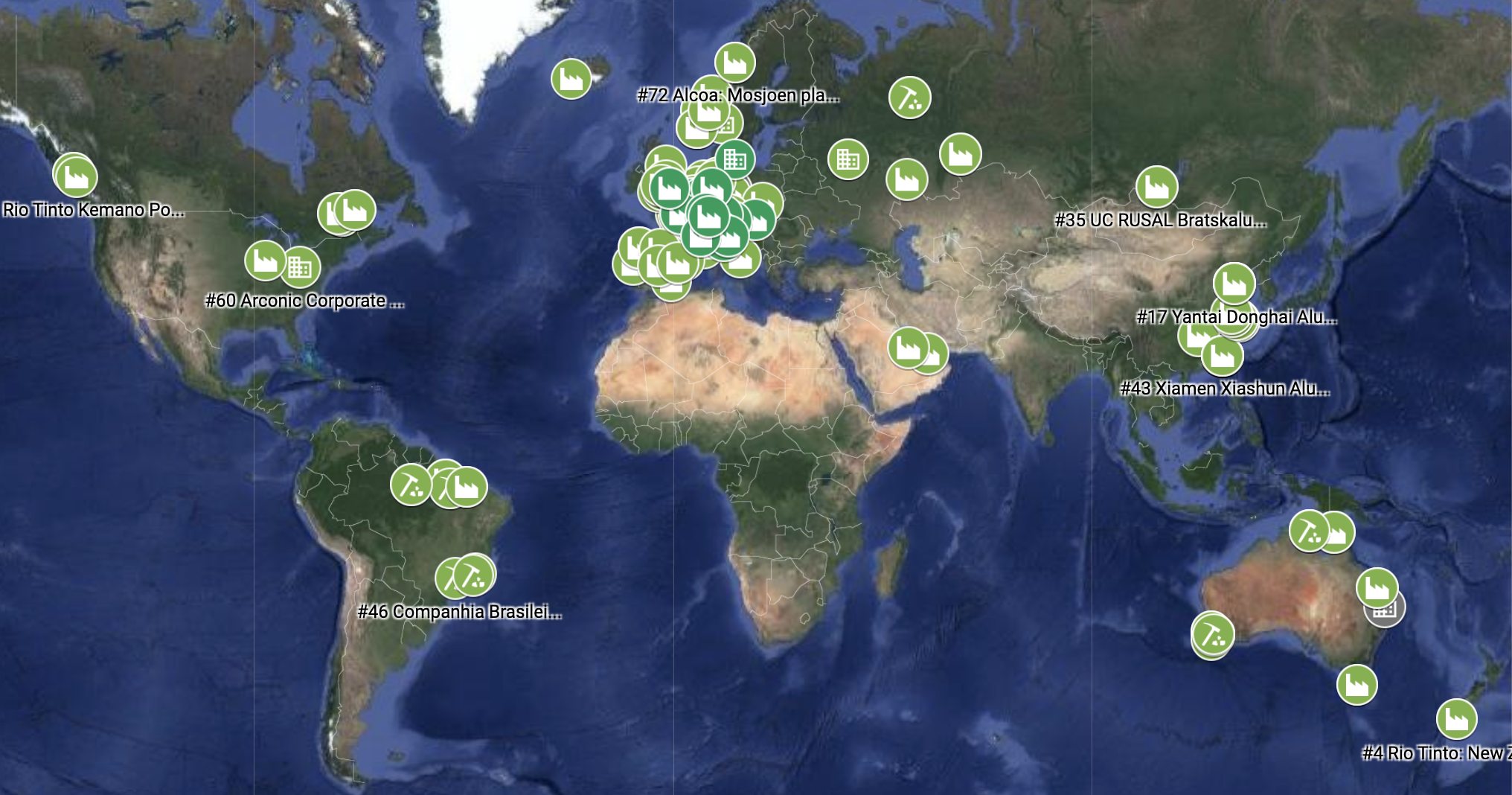The Aluminium Stewardship Initiative (ASI) program and action on human rights
For ASI, human rights due diligence in global supply chains is one of our four sustainability priority issues.
22 July 2021
|
8 July 2025
For ASI, human rights due diligence in global supply chains is a priority issue. Its importance is reflected in a July 2021 report from Human Rights Watch (HRW) and Inclusive Development International (IDI): ‘Aluminum: The Car Industry’s Blind Spot – Why Car Companies Should Address the Human Rights Impact of Aluminum Production’.
ASI is a multi-stakeholder membership organisation, incorporated in 2015, that provides an inclusive platform for engagement and action for a wide and growing range of stakeholders. We take a whole-of-value-chain approach, providing an end-to-end platform for efforts on responsible production, sourcing and stewardship in the aluminium sector, addressing a broad suite of sustainability issues, including human rights.  The ASI Theory of Change specifically addresses the responsibility of business to respect human rights, and the need for these principles to become increasingly embedded in aluminium production, use and recycling. When considering the challenges of rolling out human rights due diligence processes at a global scale – across aluminium sector activities as diverse as resource extraction, mineral processing and manufacturing and a range of use segments (such as transport, building and construction, packaging and other consumer and commercial applications) – ASI is taking a comprehensive approach. We focus on only one commodity, but use that as the connection through the entire commercial ecosystem and the millions of people impacted through all the steps.
The ASI Theory of Change specifically addresses the responsibility of business to respect human rights, and the need for these principles to become increasingly embedded in aluminium production, use and recycling. When considering the challenges of rolling out human rights due diligence processes at a global scale – across aluminium sector activities as diverse as resource extraction, mineral processing and manufacturing and a range of use segments (such as transport, building and construction, packaging and other consumer and commercial applications) – ASI is taking a comprehensive approach. We focus on only one commodity, but use that as the connection through the entire commercial ecosystem and the millions of people impacted through all the steps.
ASI’s governance model clearly shows that it is not ‘industry-led’, as it is built on a multi-stakeholder framework that provides for a balance of interests in decision-making. Standards governance and corporate governance are separated, with formal nomination and election processes for each. We greatly appreciate the involvement of diverse civil society organisations, impacted communities, upstream producers and downstream users, as well as independent directors, in ASI’s various layers of governance. Sustainability and human rights risks in the aluminium value chain drove the collaborative establishment of ASI and are central to our work every day.
Certification is not the only tool – but an important one
The HRW/IDI report rightly notes that independent third-party certification is only one tool to drive and support human rights due diligence, within a broader suite of processes, including government regulation and measures to implement protection of human rights, international, national and local stakeholder efforts and direct business action. That tool is nevertheless an important one and often referenced by the others. ASI members in the automotive sector are among the many stakeholders that have worked to develop and promote ASI Certification, and this should be seen as a positive effort in support of human rights. The automotive sector is complex, global and multi-tiered and ASI provides standardised tools to cascade through this massive supply chain, alongside broader and targeted efforts.
ASI standards, assurance and oversight processes promote the due diligence measures identified in this report, and our program has a range of systems and controls in place for integrity risks.  ASI is a Code Compliant member of the ISEAL Alliance, ensuring our systems are externally reviewed for conformance with the ISEAL Codes of Good Practice. ASI Certification – against both the Performance Standard and Chain of Custody Standard – can be sought by all companies that produce, transform or use aluminium throughout the global aluminium value chain. A comprehensive supply chain due diligence approach ultimately relies on collective action by committed actors. ASI aims to play a strong role in driving this engagement for the aluminium sector. In addition to the certification program, our Human Rights Policy aims to address our own corporate responsibility and actions, in addition to what is delivered through our standards programs and implemented by ASI members.
ASI is a Code Compliant member of the ISEAL Alliance, ensuring our systems are externally reviewed for conformance with the ISEAL Codes of Good Practice. ASI Certification – against both the Performance Standard and Chain of Custody Standard – can be sought by all companies that produce, transform or use aluminium throughout the global aluminium value chain. A comprehensive supply chain due diligence approach ultimately relies on collective action by committed actors. ASI aims to play a strong role in driving this engagement for the aluminium sector. In addition to the certification program, our Human Rights Policy aims to address our own corporate responsibility and actions, in addition to what is delivered through our standards programs and implemented by ASI members.
ASI’s current major Standards Revision process – which commenced after three years of implementation of the current Standards and to which all interested stakeholders can contribute – embraces our commitment to continuous improvement. ASI has an active multi-stakeholder Standards Committee and Human Rights Working Group which have developed a range of draft revisions in the ASI Standards, including on human rights issues, and these were open for public consultation in March-April 2021. Current criteria in the Performance Standard are being further expanded in the areas of human rights due diligence, women’s empowerment and gender equity, Indigenous Peoples and Free Prior and Informed Consent (FPIC), resettlement in alignment with IFC Performance Standard 5 at minimum, and closer alignment with the OECD Due Diligence Guidance for Responsible Supply Chains of Minerals from Conflict-Affected and High-Risk Areas. ASI refers to internationally recognised standards such as the UN Guiding Principles, the IFC Performance Standards and OECD Guidance to enhance harmonisation and not ‘reinvent the wheel’. The ASI Standards Committee have commissioned two independent studies on audit report findings for biodiversity and social/governance topics to review consistency and accessibility. ASI’s Assurance Manual is also being updated to align with more detailed auditor training on stakeholder engagement during audits – but the expectation is already clearly built in. We anticipate the current Revision process will conclude in May 2022 following a further round of public consultation, and we encourage stakeholders to contribute on issues that matter to them.

Gulkula Mining, the world’s only Indigenous-owned and operated bauxite mine and ASI Certified Member.
Direct local community engagement – the ASI Indigenous Peoples Advisory Forum
More broadly, ASI is also engaged in ‘beyond certification’ activities through our Indigenous Peoples Advisory Forum (IPAF), including efforts to build community capacity, to improve community resilience and to amplify local and marginalized voices. ASI’s Standards Committee is 24 individuals comprised of half industry and half non-industry representatives. This currently includes four direct Indigenous community representatives impacted by bauxite mining from India, Ghana, Suriname, and Australia and an NGO representative from Guinea – bringing valuable regional diversity for a globally applicable standard for this sector.
ASI-IPAF meetings have provided important opportunities for impacted communities to come together and share experiences.  As we were unfortunately unable to convene our annual cross-border in-person IPAF meetings during 2020 and 2021 due to the Covid-19 pandemic, we provided IPAF representatives with financial resources and technical support to carry out their own community consultations to feed into ASI’s Standards Revision, including in Guinea. Their valuable report has been published and these IPAF members discuss their efforts in a recorded webinar, highlighting their important contributions to, and engagement in, ASI standards development.
As we were unfortunately unable to convene our annual cross-border in-person IPAF meetings during 2020 and 2021 due to the Covid-19 pandemic, we provided IPAF representatives with financial resources and technical support to carry out their own community consultations to feed into ASI’s Standards Revision, including in Guinea. Their valuable report has been published and these IPAF members discuss their efforts in a recorded webinar, highlighting their important contributions to, and engagement in, ASI standards development.
ASI is also working with Gulkula Mining, the world’s only Indigenous-owned and operated bauxite mine and ASI Certified Member, on how their socio-economic model can be shared with other Indigenous communities that aspire to control development on their traditional lands and territories. The Gulkula operation is a demonstration of a mining model that can build a more sustainable aluminium industry – one that uses alternative and more inclusive approaches for engaging community members and Indigenous Peoples in all aspects of mining operations.
A standard that is not implemented is a standard that is not delivering change
ASI launched its Certification program in late December 2017 and at time of publication ASI’s Outcomes Dashboard shows there are now more than 140 Certifications issued, across 40 countries and throughout the aluminium value chain – though not yet in Guinea. The Chain of Custody Standard, in particular, provides a platform for supply chain mapping – and scale matters. For the 2020 calendar year, the share of global bauxite mining production from sites ASI Certified against both the Performance Standard and Chain of Custody Standard was around 16% . From a site perspective, and looking at primary production of aluminium, there are at least 11% of the world’s bauxite mines, 11% of alumina refiners and 20% of aluminium smelters ASI Performance Standard Certified – after just over 3 years of rollout [Sources: ASI for numerator, CRU Group for denominator, data at June 2021]. This is strong progress for a still relatively young initiative, providing a foundation for long-term industry transition, in the context of projected growing demand for aluminium globally out to 2050.
Change on the ground can be demonstrated through an ongoing audit cycle. Surveillance and re-certification audit cycles are well underway – important phases which lead to oversight of corrective action and the desired changes we are all seeking. In June 2021, as part of a monthly ‘insights’ series,
ASI published data on certified entities’ progress on addressing non-conformances. In the area of human rights, 9 non-conformances have been confirmed closed in subsequent audits to date, with corrective actions including establishing or expanded due diligence processes, and establishing or expanding engagement with local communities and councils. These definitive actions are extremely unlikely to have occurred in the absence of the ASI program. Of course, these are in addition to pre-Certification work across the board to implement new and improved approaches with the goal of meeting the Standards in the first place.
ASI publishes summary audit reports (not including commercial or personal information) to provide transparency for interested stakeholders and access to the audit process and findings. Auditors prepare the summary statements and are expected to give the reader a clear sense of how they came to the conclusion of conformance or non-conformance (major or minor). They must include references to the objective evidence reviewed, and links to publicly available reports for all criteria where the Standards require public disclosure.  While these reports are currently published as PDFs and can be accessed by Certified Member or a searchable map, ASI is finalising work to make the same information available in a ‘Public Dashboard’ in our elementAl online assurance platform. This will enable all the published data (current and historical) to be aggregated, compared and downloaded from this database in any way a user wishes.
While these reports are currently published as PDFs and can be accessed by Certified Member or a searchable map, ASI is finalising work to make the same information available in a ‘Public Dashboard’ in our elementAl online assurance platform. This will enable all the published data (current and historical) to be aggregated, compared and downloaded from this database in any way a user wishes.
In addition to scale, change and impact is also achieved through ongoing evolution of the ASI program over time. ASI is situated to play a critical role in this, incorporating both recycled and primary aluminium and covering the value chain to identify human rights risks from the mine through industrial processing to end users. There’s a balance to be struck in setting stretching but attainable goals to affect change over the broadest possible swathe of industry: to enable all end users to source better aluminium now and play their part in a continuously improving aluminium value chain into the future.
ASI and IRMA
With respect to the Initiative for Responsible Mining Assurance (IRMA), all standards programs learn from the experiences and approaches of others, and our respective programs are no exception. IRMA is also a young initiative, having launched its program focused on mines of all kinds in June 2018, approximately 7 months after ASI. Currently IRMA’s Board of 10 people (including Human Rights Watch) combine corporate governance and standards governance in a single body, a relatively small and concentrated group for a global standard covering all minerals and geographies. Regarding the IRMA Responsible Mining Standard compared with the ASI Performance Standard, there are differences of approach which stem from the different stakeholder groups involved in governance and decision-making, and materiality of issues for the program’s specific scope. Nevertheless, in general there is strong overlap in topics addressed for mining activities, though this is only one aspect of ASI’s broader supply chain scope for aluminium as a whole.
IRMA is still in its ‘Launch Phase’ and its published standard includes a number of ‘flagged issues’ (e.g. Resettlement, GHG emissions) where agreement on the criteria are not yet final. At July 2021, there are currently only 2 completed ‘initial audits’, according to the Mines under Assessment page on the IRMA website. One is for a platinum group metals mine, and the other for a lead/zinc/ copper/silver mine. The HRW/IDI report highlights the topic of resettlement, but in both audit reports the IRMA Standard’s criteria were deemed ‘not relevant’, even though in one case previous resettlements had been carried out by the government for that operation. The topic of conflict minerals, while not ‘flagged’ in the Standard, is not yet being applied in these audits because IRMA notes they are currently developing a different approach; in the meantime, no aspect of the ‘information collected’ is published. One aspect of the IRMA report which does not provide transparency is that findings of ‘Does Not Meet’ the Standard do not include any basis or information for the rating – the column is left blank. While the IRMA and ASI Standards are constructed differently, the depth of findings for parallel criteria in the published audit reports is often similar, though in some cases is more extensive in the ASI report and includes links to more information where ongoing disclosure and reporting is part of the Standard’s requirement.
IRMA does include a scoring approach, which implies a direct equivalence of metrics across mines of different minerals/metals, in different jurisdictions and operating contexts, and different scale of operating company/ownership – that a, say, 72.8% score in a topic in one place can be comparable to the same score in any other context. ASI does not support quantitative benchmarking of auditor findings through scores for topics as diverse as human rights and climate change, which implies both absolute and relative metrics. Comparisons between conformance, minor and major non-conformances across companies can nevertheless be made under ASI, with information provided as to the nature of the non-conformance. ASI uses this information to inform new guidance and training development, and support improvements over time. Corrective actions for non-conformances are required under ASI Certification. The goal of our standards system is the substantive change in practices, not a score improvement.
We are pleased to have members in common with IRMA – BMW, Mercedes-Benz, IndustriALL, Fauna & Flora International and IUCN. We believe ASI provides a forum for focus on the entire aluminium value chain, while IRMA works to address a wide range of mines and minerals that have usually had less action on human rights issues to date. Engagement at both a membership and Secretariat level provides the opportunity for cross-learning for both programs.
Transparency and engagement are key
ASI is strongly committed to transparency, and there is a wealth of information available on the ASI website. This includes Standards Committee minutes and Board minutes, summary audit reports for Certified Members and a searchable map of ASI Certifications, analyses of outcomes and impacts, links to recorded webinars and training for implementation, and much more. We continue to add data and tools to meet stakeholder interests and expectations, and support our own journey of innovation and continual improvement. If these issues are of interest to you, we welcome your engagement and action on responsible sourcing of aluminium.
While we agree with HRW and IDI regarding the important roles of all stakeholders to promote supply chain due diligence, we disagree that ASI provides ‘little reassurance about whether and how a company is respecting human rights on the ground’. ASI is tackling complex issues at scale, working with a wide range of stakeholders, and providing an end-to-end platform for participation and action. ASI Standards, Certification and audit reports provide direction and insights in the aluminium value chain that did not exist only four years ago. Working together with all interested stakeholders, ASI will continue to drive towards our collective and respective goals – including on human rights due diligence.
Dr Fiona Solomon
ASI Chief Executive Officer
22 July 2021
RELATED TOPICS:
human rightsindigenous peoples advisory forumindigenous rightsIPAFISEAL
SHARE THIS ARTICLE


